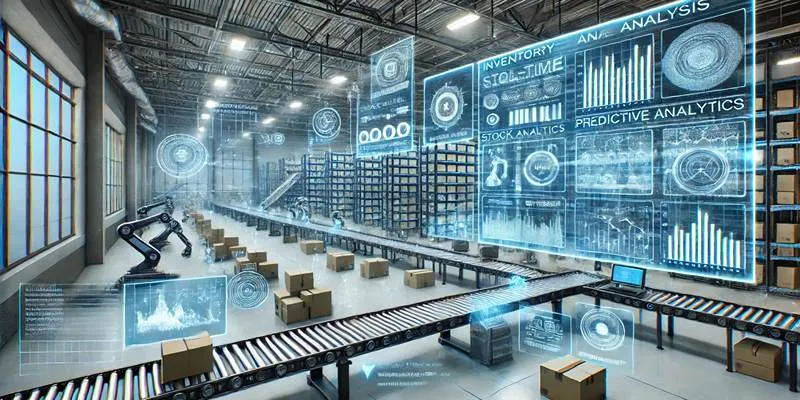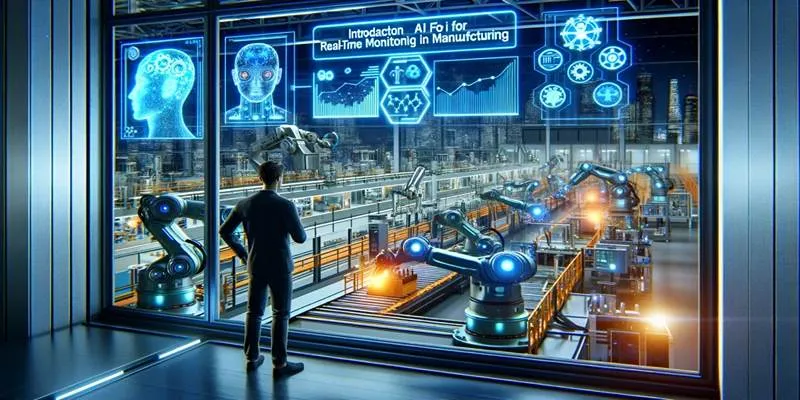In today’s fast-paced world, businesses are increasingly leveraging Artificial Intelligence (AI) to enhance the efficiency of their manufacturing processes. AI is no longer just a buzzword in supply chain optimization; it is transforming industries and making production more efficient. With AI, companies can automate tasks, reduce errors, make informed decisions, and anticipate market trends. Let us explore how AI is revolutionizing manufacturing and supply chain management.
What is AI in Supply Chain Optimization?
AI in supply chain optimization involves utilizing technologies like machine learning, data analytics, and robotic process automation to enhance the efficiency, accuracy, and speed of supply chain operations. By harnessing AI, manufacturers can make data-driven decisions, anticipate future demand, and proactively address issues before they disrupt production.
AI in supply chain optimization helps companies:
- Predict demand fluctuations
- Streamline inventory management
- Automate processes
- Optimize logistics and transportation
- Enhance decision-making based on real-time data
The result is a more agile, cost-effective, and responsive supply chain that improves the overall efficiency of manufacturing operations.
Key Areas Where AI is Optimizing Manufacturing Processes
Let’s explore the various ways AI is transforming the manufacturing sector and streamlining supply chain processes.
Predictive Analytics for Demand Forecasting

One of the biggest challenges in production is accurately predicting customer demand. Poor forecasts can lead to excess inventory and increased storage costs or stockouts and missed opportunities.
AI uses predictive analytics to analyze historical data, market trends, and variables such as seasonal demand fluctuations, consumer behavior, and economic conditions. These insights enable manufacturers to accurately predict future demand, allowing them to adjust production schedules and optimize inventory levels.
Benefits of Predictive Analytics in Manufacturing:
- Reduced inventory costs : Ensures that manufacturers only produce what’s necessary, minimizing excess stock.
- Fewer stockouts : Aligns inventory levels with customer demand, preventing missed sales.
- Improved customer satisfaction : Timely deliveries and consistent product availability lead to higher customer satisfaction.
Streamlined Inventory Management
Inventory management is a crucial aspect of supply chain optimization. AI significantly enhances how manufacturers manage raw materials, work-in- progress items, and finished goods. Traditional inventory management systems rely on manual data entry and periodic checks, which can be error-prone and time-consuming. With AI, inventory management becomes automated and data- driven.
AI’s Role in Inventory Management:
- Real-time tracking : Automatically updates stock levels and usage across various locations.
- Dynamic inventory optimization : Ensures the right amount of inventory is maintained, minimizing storage costs while avoiding shortages.
- Predictive reordering : AI predicts when new materials or components need to be ordered and triggers the restocking process when stock levels are low.
Optimizing Supply Chain Logistics
Logistics is a vital component of the manufacturing process, and AI plays a significant role in optimizing the movement of materials and products through the supply chain. AI-powered solutions can identify the most efficient transportation routes, considering factors like traffic, weather conditions, and shipment priority. AI-driven logistics solutions help manufacturers reduce shipping costs, minimize delays, and improve delivery accuracy.
How AI Optimizes Logistics and Transportation:
- Route optimization : AI ensures that transportation is as efficient as possible, reducing fuel consumption and delivery times.
- Real-time tracking : Provides real-time tracking of shipments, allowing manufacturers to identify delays or issues early and take corrective action.
- Dynamic scheduling : AI adjusts shipment schedules based on availability, delivery deadlines, and other constraints, ensuring optimal use of transportation resources.
Intelligent Automation in Manufacturing
Automation has been integral to manufacturing for years, but with AI, automation is more intelligent and adaptive than ever. AI-powered robots and machines can perform complex tasks such as assembly, packaging, and quality control, all with minimal human intervention.
By integrating AI into manufacturing equipment, businesses can optimize their production lines. AI systems can also predict when a machine is likely to fail or require maintenance, preventing costly downtimes and ensuring continuous operation.
Benefits of Intelligent Automation:
- Improved efficiency : Machines can work continuously, 24/7, increasing production capacity and speeding up turnaround times.
- Better accuracy : AI-powered robots are more precise and less prone to human error, resulting in higher-quality products.
- Cost savings : Reduces the need for manual labor and helps companies lower operational costs.
Real-Time Monitoring and Quality Control

Ensuring high product quality is a major priority in manufacturing, and AI is revolutionizing quality control processes. Traditional quality control often involves human inspectors who manually check products for defects, which can be slow and inconsistent.
AI-driven computer vision systems automatically detect defects during production. By analyzing images and videos of products on the production line, AI quickly spots issues like cracks, misalignments, or material defects.
AI in Quality Control:
- Faster defect detection : AI inspects products in real-time, catching defects as soon as they appear.
- Improved consistency : AI ensures that quality control is standardized, eliminating variations caused by human inspectors.
- Reduced waste : AI identifies and eliminates defective products before they move further down the production line.
Conclusion
AI in supply chain optimization is transforming manufacturing by improving efficiency, reducing costs, and enhancing production timelines. From demand forecasting and inventory management to intelligent automation and quality control, AI helps manufacturers streamline their processes, improve decision- making, and stay ahead of the competition. By adopting AI solutions, manufacturers can future-proof their operations, ensure high product quality, and achieve significant cost savings. While implementing AI may require an upfront investment, the long-term benefits are undeniable.
 zfn9
zfn9























